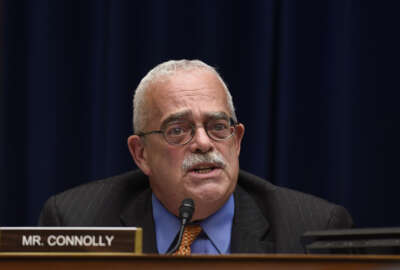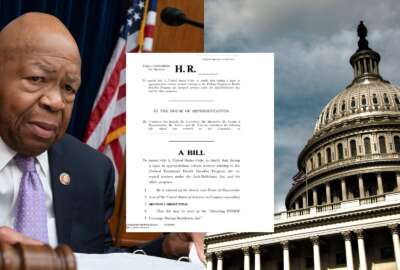
Paid family leave, plus 5 other things civilian feds should know about the NDAA
The House-passed 2020 defense authorization bill includes paid family leave for federal employees, as well as another legislative attempt to block the Trump...
Both the House and Senate have cleared their own versions of the 2020 defense authorization bill, leaving it up to congressional leadership now to develop a path toward compromise.
There are plenty of provisions in both versions of the National Defense Authorization Act that should catch the eyes of federal employees, even though both 2020 defense policy bills are relatively light on signature, governmentwide provisions that would impact much of the workforce.
Unlike previous years, neither the House nor the Senate made serious attempts this year to raise the maximum amount that civilian agencies can offer in the form of Voluntary Separation Incentive Payments (VSIP).
And neither chamber took up the legislative proposals the Office of Personnel Management offered earlier this spring, which suggested changes to agency intern hiring, probationary periods and direct-hire policy.
Both chambers will need to conference over the bill, though it’s unclear when those discussions will begin. Most lawmakers are still waiting for congressional leadership to agree to top-line spending numbers for 2020.
Still, here are several provisions that federal employees should watch in the coming months, as the House and Senate try to reach an agreement on final version of the 2020 defense policy bill.
House
12 weeks of paid family leave
The push to give federal employees paid leave took another, definitive step forward this week, as House Democrats included the Federal Employee Paid Leave Act within the defense policy bill.
The legislation would guarantee up to 12 weeks of paid leave for federal employees to witness the birth, adoption or fostering of a new child and care for a new child or family member with a serious medical condition. The leave would also apply to federal employees who have a serious medical condition themselves and need time to recover.
Related Stories

Congress not yet convinced of Trump administration’s proposed OPM-GSA merger

Lawmakers introduce protections for federal employee health benefits ahead of future shutdowns
“If Congress takes seriously the recruitment and retention challenges facing the federal government, such as a well-documented skills gap and the need to fill mission-critical positions, then implementing a paid family leave policy that is a human resources best practice is a no-brainer,” Ken Thomas, president of the National Active and Retired Federal Employees (NARFE) Association, said Wednesday in a statement. “With the federal workforce aging, recruitment of young workers is more important than ever, and offering paid family leave is a good step toward meeting those challenges.”
The Federal Employee Paid Leave Act would replace the patchwork of options that government employees currently have to take sick, maternity or paternity leave. It applies to most federal employees, men and women.
The Senate NDAA doesn’t include this proposal.
Another attempt to block the OPM-GSA merger
Rep. Gerry Connolly (D-Va.), chairman of the Oversight and Reform Government Operations Subcommittee, offered up another legislative attempt to stop the administration moving forward with the administration’s proposed merger of the Office of Personnel Management with the General Services Administration.
Specifically, it would prevent the administration from transferring, transitioning, merging or consolidating any functions, responsibilities, programs, authorities, IT systems, staff, resources or records from OPM to GSA.
The amendment cleared the House with a 247 to 182 vote. Fifteen Republicans voted in support of it. There is no companion proposal in the Senate version.
Short term relief at the MSPB
The House version also includes an amendment designed to provide some relief to whistleblowers while the Merit Systems Protection Board has lacked a quorum.
MSPB has lacked a quorum for more than two years. It’s been without a single board member since March, when the holdover term for lone member and acting Chairman Mark Robbins expired.
The amendment, which Connolly also introduced, would allow either a single member of the board, or the agency’s general counsel if it doesn’t have any members, to grant a “stay” of an agency personnel action if the Office of Special Counsel beliefs the action was taken in retaliation against a whistleblower.
Both MSPB and OSC had said this was a critical activity that would go by the wayside without a single board member.
The Senate Homeland Security and Governmental Affairs Committee has, at last, cleared all three of the President’s nominees to fill the MSPB. The Senate must still confirm all three nominees.
The amendment passed with a voice vote. The Senate’s version doesn’t include this proposal.
Federal insurance during future government shutdowns
The House version also includes bipartisan legislation that would allow federal employees to continue their coverage and enrollment in federal health and life insurance programs during future lengthy government shutdowns.
Rep. Katherine Clark (D-Mass.) included language in the House defense bill that would ensure federal employees who experience a qualifying life event, such as the birth or adoption of a child, can immediately enroll their dependents into the Federal Employee Health Benefits Program (FEHBP even during a government shutdown.
The provision also prevents employees enrolled in FEHBP, TRICARE or the Federal Employee Long-Term Care Insurance Program from losing coverage if participants enter non-pay status due to a government shutdown.
Clark was an original co-sponsor on the House standalone bill, along with Oversight and Reform Committee Chairman Elijah Cummings (D-Md.) and Government Operations Subcommittee Chairman Gerry Connolly (D-Va.) and Mark Meadows (R-N.C.).
A group of Senate Democrats, including Tim Kaine and Mark Warner (D-Va.), Ben Cardin and Chris Van Hollen (D-Md.), Sherrod Brown (D-Ohio) and Tina Smith (D-Minn.), introduced companion bills in their chamber.
The provisions were agreed to in the House by a voice vote.
Senate
More attention on security clearances
Sen. Mark Warner (D-Va.) again authored a variety of amendments and provisions designed to advance several hyped modernization efforts to the security clearance process, which all cleared the Senate version of the NDAA.
One provision would encourage the Trump administration to analyze a concept known as “clearance in person,” which industry has been advocating for. This means government could declare their trust and authorize a clearance to a particular individual, who could then take that clearance with them to other positions of trust at another agency or federal contractor.
The administration has said it’s actively interested in the “clearance in person” concept and launched the Trusted Workforce 2.0 initiative to further explore and implement more modern security clearance practices.
Another provision from Warner would require agencies to develop an electronic portal to allow employees and contractors to track their progress through the clearance process.
Other amendments are designed to provide congressional oversight as the Office of Personnel Management transfers the security clearance business from the National Background Investigations Bureau to the Pentagon.
One, for example, would help the Defense Department establish a working capital fund to bill agencies in advance for the processing of security clearances.
Another amendment would ensure the Pentagon’s new Defense Counterintelligence and Security Agency equally treats and processes all security clearances and investigations from both government and contractor applicants.
The House version also includes a request for DoD to report on adjudication security clearance backlogs. It’s unclear exactly how many security clearances have been delayed while awaiting final adjudication actions, but industry has said a backlog exists.
Public reports on Performance.gov don’t detail potential backlogs within federal adjudication facilities.
In addition, the House version also includes an amendment asking for the Government Accountability Office to study the feasibility of setting up a new DoD pilot program. The program would allow military members working in counterintelligence fields with additional security clearance credentials to quickly transition to a position within a federal intelligence agencies once they leave active-duty service.
Additional protections for whistleblowers
The Senate version also includes new protections for whistleblowers in the intelligence community, largely lifted from the Intelligence Authorization Act for 2018-2020.
It allows whistleblowers within intelligence community agencies to request an external review if they’ve exhausted all other options in pursuing their complaints.
The legislation also requires the intelligence community inspector general to set up a hotline to receive whistleblower complaints.
Relief for relocating feds
Finally, the Senate version includes legislative text that would provide relief to federal employees who may have to relocate for work. Specifically, it ensures federal employees who need to move for work and qualify to have their agencies reimburse them for moving expenses are also repaid for any taxes owed on those reimbursements.
The Tax Cuts and Jobs Act, which Congress passed in 2017, eliminated the deduction federal employees could previously take to alleviate the costs of relocating and moving their household items. Those moving reimbursements were being taxed as ordinary income, and agencies were compelled to have their employees foot the bill.
The provision came from Warner, who has proposed similar standalone legislation on multiple occasions.
Copyright © 2025 Federal News Network. All rights reserved. This website is not intended for users located within the European Economic Area.
Nicole Ogrysko is a reporter for Federal News Network focusing on the federal workforce and federal pay and benefits.
Follow @nogryskoWFED



